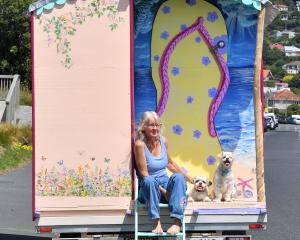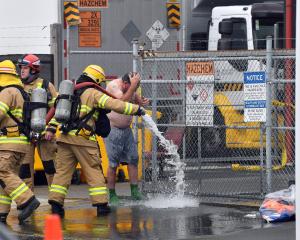The sight of a Dunedin scarfie riding a moped wearing only shorts, a singlet and helmet makes Pete Daly shudder. ODT reporter Shawn McAvinue spent a morning with the motorcycle training instructor to learn how to "ride forever'' on one of the most dangerous motorcycles known to man.
A student on a moped is travelling south on George St in North Dunedin.
He's wearing shorts, a singlet and no footwear.
The only safety gear he's wearing is a crash helmet.
To get beyond a line of vehicles waiting at the traffic lights, he makes a gutter-hugging manoeuvre.
The move is risky but legal.
But if the light turns green, a vehicle turning left to Frederick St would not see the moped making its way up and could run over it.
However, if the van hit the motorcycle, the van driver would be at fault.
But fault doesn't matter, Ride Forever instructor Pete Daly said.
"Because once you've got the broken arm or broken leg, arguing about fault doesn't make a lot of difference.''
The student needs a bit of education, Mr Daly said.
The Christchurch-based trainer knows motorcycles.
He owns a moped and a touring bike - a 49cc Adly Silver Fox moped and a 1200cc BMW R1200RT.
He ended a 27-year career as a police officer in May, which included about 10 years on a patrol bike and as a motorcycle sergeant.
Since finishing with the police, he picked up some contract work with the Accident Compensation Corporation to train people to be more confident, competent and safer riders.
"I get a great deal of satisfaction by helping people to be better motorcyclists.''
He travels around the South Island to teach the Ride Forever course, wherever there is enough demand.
Riders can choose from four courses on offer - bronze, silver, gold or urban.
The courses include about 70% on-road training.
The instructor talks to students via a transceiver.
The eight-hour bronze, silver and gold courses cater for open road riders of different experience levels.
The four-hour urban course caters for those who are riding around town.
Riders of all motorcyles are welcome to attend the urban course.
Recently a rider brought his 675cc Triumph Street Triple because he wanted to learn how to "interact better'' with traffic on it, Mr Daly said.
Most arrive at the urban course on a 49cc moped.
Riding a moped was riskier than riding a more powerful motorbike because most accidents involving motorbikes happened in urban areas and a moped's lack of grunt encouraged riders to travel in a more dangerous manner, such as "hugging the left-hand side of the road'', he said.
Moped riders who kept left were in a compromised position.
"We encourage people to own their lane, get out there and be part of the traffic ... if we don't put ourselves in a compromising position, we are less likely to be compromised ... It's that simple.
"It's positioning for my visibility but also for people's visibility of me.''
All riders should wear protective clothing, including gloves and covered footwear.
"If you fall off your moped at 50kmh, or you fall off your a Harley Davidson at 50kmh, it doesn't matter what you fell off, you're still sliding down the road at 50kmh.''
Many riders refused to take the course because they felt they knew it all, Mr Daly said.
Even the most experienced riders could learn something.
"At the very least, we can validate their good habits and build in some stuff they may not have ever thought of.''
ACC senior motorcycle injury prevention specialist Dave Keilty, of Wellington, started the Ride Forever courses in 2012.
The initiative originally aimed to have 1000 riders taking the course each year.
The target was easily reached, with about 3500 riders completing the courses nationally in the first three years.
"It just took off.''
ACC wants 5000 riders to participate per year for the next three years and has heavily subsidised the courses - for the urban course, ACC paid $125 and the rider paid $20.
Riders can register at www.rideforever.co.nz.
What I learned on the course
When I signed up for ACC's Ride Forever urban commuter course, the woman taking the booking asked me to rate my riding ability and list any areas where I'd like to improve.
As my ability was near-perfect, I struggled to find areas for improvement.
But I did learn a thing or two.
• The importance of road position for a moped so the rider gets the best view of the road and motorists get the best view of the moped.
• When waiting behind a vehicle at an intersection, the best place to wait is well behind a vehicle, in line with the car's right wheel.
This position gives the moped rider better visibility and keeps them from riding over slippery road markings.
• Don't trust rear-view mirrors and turn to look for traffic before changing lanes.
• To turn tightly, accelerate and use the rear brake, and don't look down when turning.
• It's legal to ride a moped in a bus lane but illegal to ride in a bike lane.












